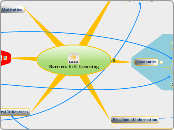
Barriers to E-Learning
Motivation
No peer pressure

Having to work alone

Contact with like-minded people
literacy
Computer Literacy
Basic skills needed
Design of Website
Useability
Design of Course
Sensible sequence
Cultural Differences

Time Zones

Asynchronous learning
Language
World Language

Visual presentation
Location
Virtual Classroom
Accessibility
Special Needs
Economics
Network Access
Libraries
Technical problems

PC access
Cost of course
Freedom of information
Access limited by filters, firewalls, local law, etc
